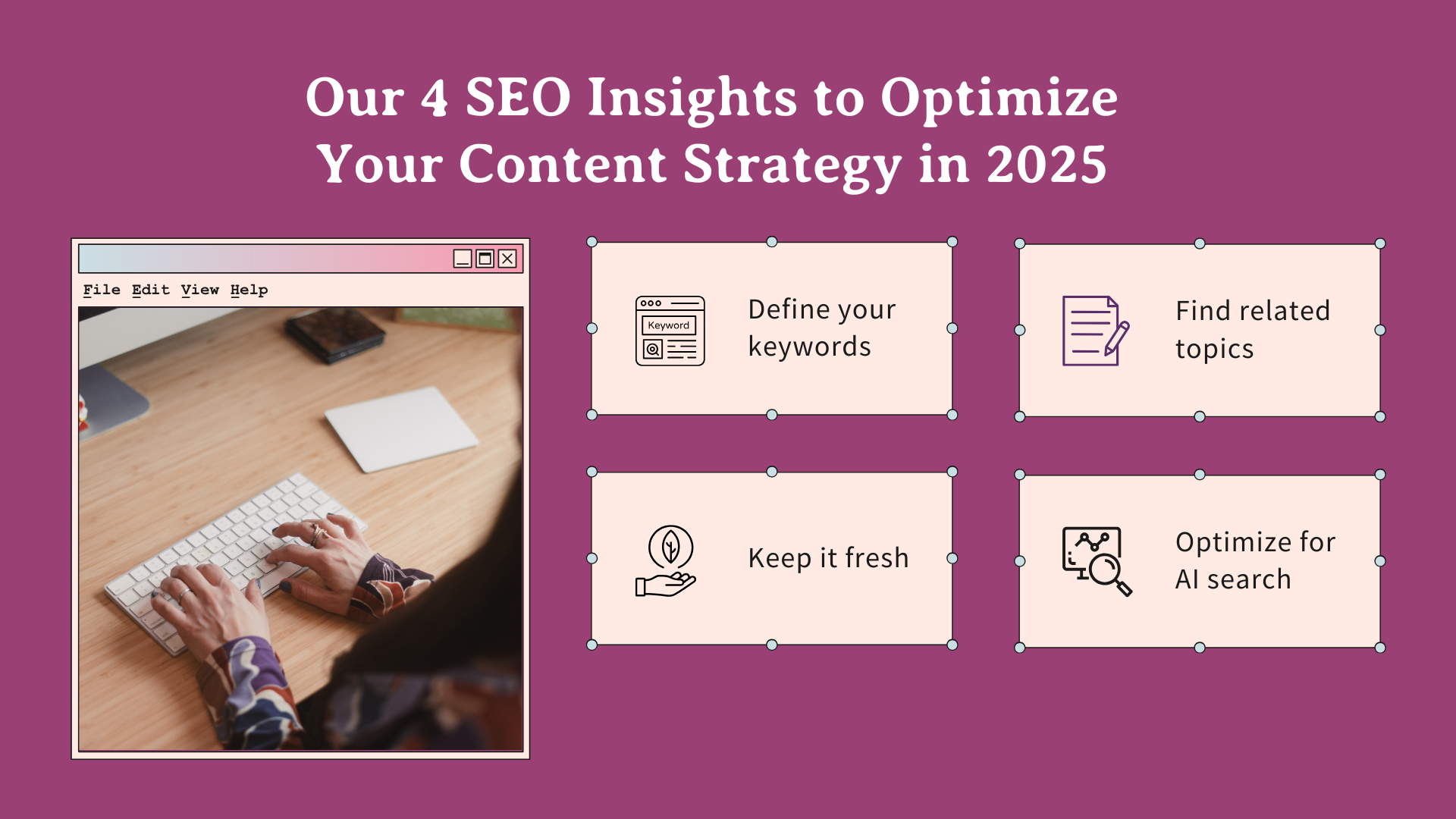Our 4 SEO Insights to Optimize Your Content Strategy in 2025
The world of SEO is complex and always changing, but if you want new people to find your content in 2025, you can’t afford to ignore it.
Whether you are writing blogs, product descriptions for an online store or any other web content, your content doesn't mean much if nobody finds it, so it’s important to consider how search engines – and now AI search tools – might find you. As you develop your next round of content, or get ready to revise your entire strategy, make sure to plan with SEO in mind.
Here are our top four SEO insights for optimizing content strategy in 2025.
1. Define your keywords and content pillars
This is SEO 101, but it’s still the place to start, and something to revisit regularly. Make sure your keywords are relevant and will drive the kind of traffic you want to your pages, and focus on a handful of “content pillars” or topics that support your overall goals and provide structure for all of your content.
It is generally helpful to start with one primary keyword for your website, and then branch out into secondary and related keywords (we’ll get into that in the next section). If you are just starting out or wanting to revamp your SEO efforts, the keyword tool from Semrush can be helpful in identifying the keywords you’re already using, and providing some insights.
For content pillars, First Page Sage recommends choosing four to six topics and focusing your keyword research around those as a manageable yet thorough approach.
And of course, once you’ve defined all that, make sure you actually use them!
2. Find related topics and keywords
While far from a new idea in SEO, including synonyms, related keywords and “long-tail variations” (highly specific, multi-word terms) in your copy is becoming increasingly important. Major search engines have come a long way in how they process searches and “interpret” the words and phrases users input, having gotten a lot better at natural language processing and “understanding” the context of a search.
Search engines have been growing in this direction for a while, but with AI tools taking over an increasing share of internet search, this strategy has become even more important. Research data shows that the sheer number of words users enter in an average search query using AI tools is multiple times higher than on conventional search engines, and the complexity of what they are asking is often higher as well.
This means that using a broader range of unique words related to your topic should help your content be found, indexed and ranked higher for relevant queries on both types of search platform. AI tools are looking for both breadth and depth on a subject.
So, make sure to identify your keywords as usual, but also make an exhaustive list of synonyms and possible alternate words and phrases to ensure your content reads as thorough and matches as many (relevant) searches as possible. Adding mention of topics related to your content, even if you don’t discuss them in depth, can also help make your content more attractive to AI search tools.
3. Keep it fresh
Search engines tend to prioritize fresh content, but this doesn’t necessarily have to mean new content all the time.
If you have the capacity to publish high-quality, original content several times per week – and sustain that pace long-term – Google will certainly reward you for it. Research shows that, everything else being equal, regular publishing that it views as high-quality will increase your domain authority and, by extension, search ranking and website traffic.
However, that’s a high bar for most businesses to reach and sustain.
Another way to optimize for “freshness” in your SEO is simply by updating your existing content. Do this periodically, add a fresh timestamp, and search engines will be more likely to keep sending people your way. Certain types of content work better for this than others, something we call “evergreen” content – check out our very own evergreen post on this long-lasting content for tips on how to create and maintain these kinds of pieces.
4. Optimize for AI search while you’re at it
As we’ve already mentioned, some SEO strategies overlap substantially with optimization for AI search due to the changing nature of search engines. But there are some aspects unique to AI search that require additional work if you want users to find you with these tools.
SEO consultant Aleyda Solis offers a thorough list of recommendations for AI search optimization in a recent post, including optimization for “chunk-level retrieval” and “citation-worthiness.”
Chunk-level retrieval means sticking to one idea per section, paragraph or “chunk,” and keeping those passages concise and easily understandable on their own, without users needing to read preceding sections.
Citation-worthiness, at least in this case, means using specific, fact-based claims, and listing citations, credentials and timestamps where relevant.
If possible and relevant to your industry, Solis also suggests optimizing for “content authoritativeness signals,” which is effectively a combination of managing your online presence well (consistent branding, working links, responding to reviews, etc) and publishing and promoting true original content. Consider conducting studies or surveys within your industry and publishing the results. Once you’ve done that, try to get coverage from media and other websites and blogs to reinforce that leadership and authority.
Ultimately, these things are helpful for regular SEO too, but AI search disproportionately rewards content that prioritizes this stuff, because it makes it easy for them to lift and present as an “answer” to a question. And with more and more search being done on AI tools, the effort involved is more and more likely to pay off.

Need help with your SEO?
If you’ve already got a good grasp of SEO principles, the above tips should help you continue to find success as the industry changes around us. But if you don’t know where to start, or would like to see how working with a boutique agency like ours could help elevate your SEO and digital marketing, get in touch! We would be happy to work with you and transform your online presence into something custom-made for your industry in 2025.

